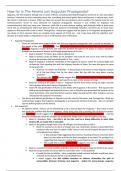How far is The Aeneid just Augustan Propaganda?
Augustus, the first emperor (though not in name) of Rome, commissioned Virgil through his version of an ‘arts and culture
minister’ Maecenas to write something about him, something that would glorify Rome and become a national epic, much
like Homer’s had been in Greece. When we take into account the circumstances of its creation, The Aeneid, from its very
commencement, seems to most obviously be Augustan propaganda, because it was written for Augustus and
commissioned by that very same man. However, while this is a most obvious reading, and obviously holds at least some
merit, the act of pinning the entire epic down to that one purpose is horrifyingly reductive, and there are so many more
aspects to this poem that come to mind. Through this, I would not suggest that the poem is not Augustan propaganda in
any shape or form, because there are certainly some aspects of it that are – but I take issue with the adjective ‘just’,
because it is quite simply so reductive for such a multi-faceted piece of literature.
Augustan Propaganda
o There are certainly some aspects of the epic that are Augustan propaganda, and it cannot be doubted, in
the words of the critic R D Williams, that ‘the major intention of Virgil’s poem was to glorify his own
country.’ Augustus is both directly and indirectly glorified throughout the poem in various situations,
through the character of Aeneas and through appearances of his own.
Book I: [Jupiter] ‘To them I give empire without end.’
Book II: Aeneas carries his father on his shoulders and leads his son out of Troy, with his father
carrying the penates (the household gods) of Troy – piety.
Book VI: Augustus is directly mentioned in the pageant of heroes, where he is placed right next
to Romulus, thus equating him with the originary founder of Rome, the man who gave his name
to the great city.
However, he misses out fratricide – is this perhaps a comment on how Augustus sweeps
all of the bad things that he has done under the rug with the new name, erasing
Octavian?
The ancient critic Servius would suggest that Virgil’s intention was to praise Augustus by
means of his ancestors, so perhaps this is more of the attempt of Virgil.
Book VII: closing of the gates of Janus – Augustus did this three times during his reign, and this
had only been done twice before (Augustan Pax)
Book VIII: the glorification of Rome on the shield, with Augustus in the centre – this equates him
with great mythological and historical heroes, such as Manlius who prevented the invasion of the
Gauls and Cloelia, who saved the Roman warriors before herself and the other maidens, and was
released by the Gauls for her bravery.
o This direct and indirect glorification of Augustus sets the tone for the poem, and, through this, I think we
could perhaps suggest that Augustan propaganda is an important element of the epic – but it is certainly
not the defining feature of the Aeneid.
Anti-Augustan?
o As explored above, Aeneas can be interpreted to be a kind of figure for Augustus – they seem to have
two particular qualities that tie them together, those being piety and a seeming lack of desire for power,
and T R Glover would suggest that ‘the emperor was a sort of painter’s model for Aeneas’ – and this
becomes problematic when we consider the problematic things that he does throughout the epic.
Book IV: abandons Dido – but this is for his fate, and he is doing differently to what Mark
Antony did, so maybe this is excusable.
Book VI: the golden bough must come off willingly, but Aeneas has to pull it.
Book VII: Lavinia has to marry a foreign man, but, technically, Aeneas is descended from
Dardanus who was born in Latium, while Turnus is the actual foreigner because he does
not originate from Latium.
o Is this perhaps Virgil suggesting that Aeneas’ founding of Rome may have been
fated, but the other stuff that he does throughout is not fated? Or perhaps he is
suggesting that Augustus’ claims that he was fated to rule over Rome are false?
o This could link to what Jasper Griffin suggests was seen as ‘the uncontrolled
domination of a man whose whole career was illegal’.
Book X: commits to human sacrifice and kills a priest even though he begs for his life to be saved.
Book XII: brutal murder of Turnus after he sees Pallas’ belt – is this justified?
It could link him to Achilles – who completely lacked restraint and who would have been
criticised by the Romans for his uncontrollable furor.
I would suggest that this sudden reversion to violence dramatizes the split of
personalities between Octavian and Augustus – before his name-change, Augustus




